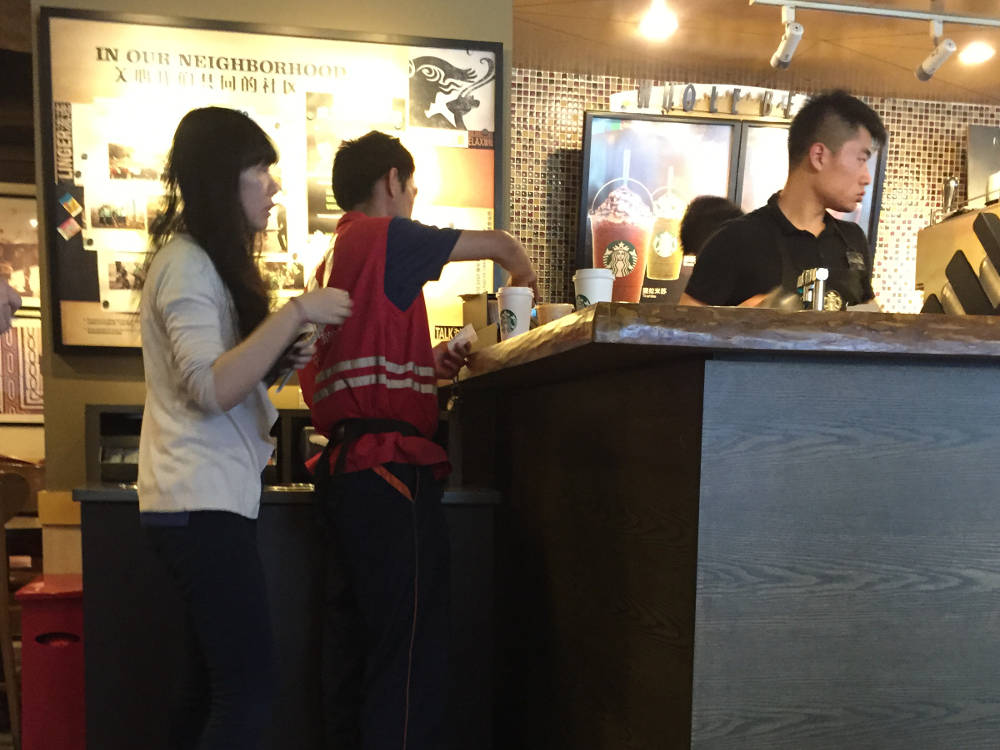About a month ago I went to Starbucks in the afternoon in a desperate attempt to shake off my post-lunch sluggishness with a latte. What would have normally been a 10-minute coffee run took me 20. The culprit? A guy in a red jacket with a huge fork emblazoned on the back. He had not one, not two, but five coffee orders, which ended up delaying everyone queued up behind him.
Over the next couple of weeks, I noticed many more of these guys in red jackets, each of them systematically taking the joy out of my afternoon coffee run. None of these come even remotely close to the average Starbucks consumer in China. They were clearly buying it for someone else. One day, out of curiosity, I tracked one to see where he went after he carefully stacked the cups in a brown paper bag. To my surprise, he went to the office tower next door, a minute's walk from Starbucks.
These men in red jackets work for logistics companies hired by an online-to-offline (O2O) food delivery service called Baidu Waimai, owned by web services company Baidu. Their job: to buy and pick up restaurant orders you placed via your smartphone, and deliver them at your doorstep. My office complex, which has at least three Starbucks outlets and countless other cafes and restaurants, is teeming with the Baidu Waimai people. And Baidu Waimai, launched in May last year and already present in 70 Chinese cities, is not the only player in the online food delivery market in China - there are at least 10 more fairly successful ones in this extremely competitive market.
Now I do understand why you’d like your meals delivered to your doorstep, but coffee - a beverage that is either had hot or ice-cold - beats me. I, for one, would hate to get a lukewarm cappuccino minus the froth, which a delayed delivery will most certainly ensure. But that's beside the point here.
There are reasons why Baidu Waimai and the other delivery services are such a huge hit in China. A colleague of mine got bored with the restaurants in the vicinity of our office and decided to use Baidu Waimai's restaurant-delivery app to order lunch from a place farther away. Her meal - which arrived within 25 minutes - was worth it, she said.
For one, she didn’t have to make the effort to take a cab or a subway to travel 4-5 km away in the middle of a busy work day - if not for the app, she wouldn’t even have bothered with that restaurant. Two, the app allows you to order from a restaurant that doesn't have its own delivery service, effectively closing the gap between the restaurant and the consumer. Three, as more people use the app, they give star ratings to restaurants, separating the good restaurants from the riff-raff. So, essentially these apps are quickly morphing into a version of Yelp (minus the detailed reviews) coupled with delivery.
There are other significant upsides too. Since she used Baidu Waimai - and not a rival app like Daojia or Ele.me - Baidu gave her a RMB 10 discount. So her meal, priced at RMB 32, now cost her RMB 22. (In the case of some restaurants, instead of giving a cash discount, Baidu throws in freebies - such as extra chicken in KFC orders.) Next, she had to pay for the meal using an online payment service. Alipay, belonging to rival tech giant Alibaba, is the dominant payment service in China. But since my colleague chose to pay via Baidu’s own payment service, Baidu Wallet, it made her eligible for a further discount. So now she was paying even less than the RMB 22. And after she placed her order, the app gave her a discount coupon for her next order, effectively tying her into their service for the future. From the time she placed the order to when the food was delivered, she was able to track the status of the order and the delivery boy in real time.
Services like Baidu Waimai, Daojia, Ele.me and countless others have all found - and exploited - an asymmetry in the restaurant industry: there are people who want to eat at certain restaurants but are unable to, or simply find it inconvenient to go all the way and wait for a table; and there are restaurants that would want to increase their customer base without investing in expensive delivery services of their own.
It’s no wonder then that all of China’s big tech companies - Baidu, Tencent, Alibaba, JD.com, Xiaomi - are in this industry either with their own services or via investments in such companies. In 2014, the total transaction value of food deliveries via online channels stood at over RMB 15 billion, more than five times the figure in 2013, as per pintu360.com, an O2O information provider, as published by Global Times. In a short period of time, they have acquired a huge customer base: Ele.me, for instance, which was established in 2009, received 110 million orders in 2014, and sometimes has two million orders on peak days according to Global Times. Meituan, another such service, does an average of 1.5 million orders a day.
The entry of food delivery intermediaries helps everyone, most of all, the customer who gets extra chicken legs to chomp on or gets a huge cash discount. As for me, I would still rather do my afternoon coffee run myself.
[This article was published concurrently in Mint]

